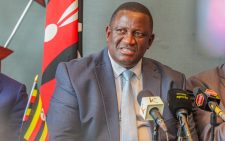This extension model helps restore soil health

An often cited reason for the underperformance of the agricultural sector is the collapse of the extension services. It wasn’t always this way though. Till the late 80s, agricultural extension services were vibrant and their ubiquity in virtually every part of Kenya was a marvel. They visited farmers in their farms and organized agricultural barazas where farmers were trained on effective farming practices that helped improve yield.
The service was well funded, and it had staff all the way to the sub-location level. That wasn’t all. There were also Farmer Training Centres (FTCs) located in all agricultural districts. Entering the early 1990s, with the advent of Structural Adjustment Programmes, the government adopted a plan that saw the restructuring of the public service including placing a freeze in new employment in new workers joining the public service.
One of the hardest hit sectors, quite predictably, was extension services. Today, more than 30 years later, the situation has scarcely improved. The ratio of extension workers to farmers is estimated at 1:5,000 compared to the recommended 1:400. This has left most farmers without such services and the practical knowledge and skills that come with it.
AGRA, the organization that works to transform African agriculture is working to change this story. Through its Strengthening Regenerative Agriculture in Kenya project, supported by the IKEA Foundation, AGRA is working with Farm Africa and the Cereal Growers Association (CGA) to enable smallholder farmers in four pilot counties – Makueni, Embu, Tharaka Nithi and Kitui – to employ innovations and technologies that help restore soil health, preserve moisture, increase yield, and link farmers to markets. One of those innovations is a concept known as the Village Based Advisors (VBA) model. VBA establishes a strong linkage amongst farmers and farmer groups. These linkages enhance easy access to farmers by value chain actors dealing with mechanization, post handling services and seed manufacturing actors.
The VBAs have been trained by AGRA partners, Farm Africa and CGA, and have been imbued with the capacity to train and provide leadership in their localities and act as aggregators for farmers’ produce.
A typical VBA can manage between 150 and 200 farmers, a strong network that collaborates to produce drought-tolerant crops that are in demand in the market. Because of their numbers, these farmers can meet the demands of a major off-taker or processor and negotiate better prices. East African Maltings Ltd, a subsidiary of East African Breweries, for instance, buys sorghum directly from the farmers through their aggregated units.
The project looks to have 250 VBAs in Embu and Tharaka Nithi counties and 300 Makueni and Kitui. The VBAs help farmers to access extension services, inputs (seeds, fertilizers, agro-chemicals), technologies for resilience and a market for their produce.
One of the business models profiled for the VBAs to enable them to offer training to farmers is agroforestry nurseries. These nurseries provide seedlings for farmers who integrate agroforestry into their farms for resilience and carbon credit trading through Rabobank.
The agroforestry business model has been projected to give a VBA a net income of Sh310,200 from the sale of 1,000 seedlings each of avocado, mangoes, macadamia, moringa oleifera, neem, Calliandra and gliricidia sepium over a period of six months. These are the most popular trees demanded by farmers in the pilot counties.
This grassroots approach to agricultural extension services has been shown to transform rural livelihoods in the counties where it is currently being practiced.
Dr. Abednego Kiwia is the Programme Officer for Strengthening Regenerative Agriculture in Kenya at AGRA.












